Iran Says Russia Will Cooperate In Developing Oil Fields
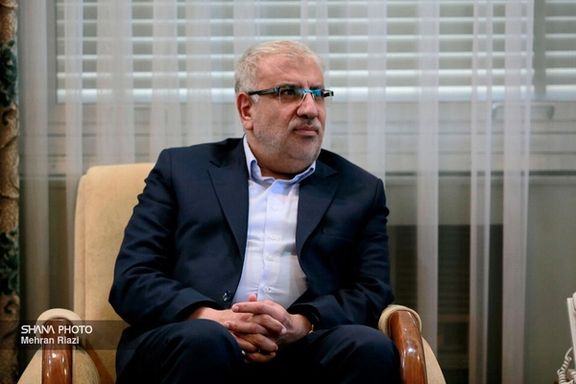
Russian companies will participate in the development of seven oil fields in Iran, the managing director of the National Iranian Oil Company (NIOC) has announced.

Russian companies will participate in the development of seven oil fields in Iran, the managing director of the National Iranian Oil Company (NIOC) has announced.
The maximum capacities of the Iranian companies will also be employed in the development of these fields, in southern and northwestern Iran, Mohsen Khojastehpour added.
Over the past two years, Iranian officials have time and again made optimistic statements about widening energy cooperation with Russia, but so far, there is no concrete evidence of any substantial contributions by Russia.
Last year, Ahmad Asadzadeh, the Deputy Minister of International Affairs and Trading at Iran’s Oil Ministry, expressed hope that the comprehensive plan of Iran’s cooperation with Russia’s Gazprom regarding the development of six oil fields and two gas fields would be finalized in a few months.
While Iran proudly announced the signing of the "largest oil and gas agreements in the country's history worth $40 billion," Russia has not converted any of these memoranda of understanding (MoU) into contracts.
About a decade ago, Iran also signed dozens of oil and gas MoUs with various Russian companies, none of which were executed.
IRNA, the Iranian state news agency, also reported last month that the country’s Oil Minister Javad Owji visited Moscow to hold talks with Russian officials about turning MoUs into contracts. He claimed that Tehran and Moscow can employ their joint capabilities to neutralize sanctions against both countries.
Despite Tehran’s call on Moscow to help develop its energy fields, Russia itself has been facing technical challenges since several western companies pulled out of joint energy projects due to the sanctions slapped on Moscow over the Ukraine war.
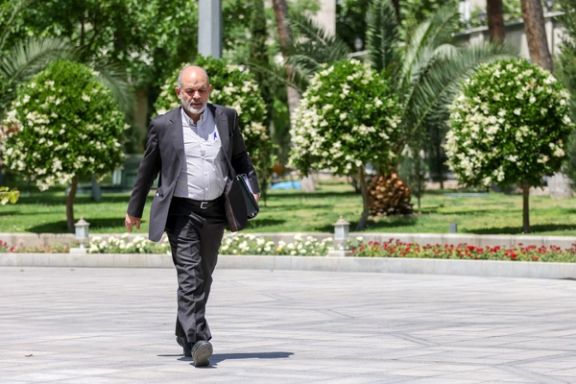
Iran’s Minister of Interior has slammed the previous government, hailing the current hardliner administration as "impossible to isolate” from the international community.
Ahmad Vahidi, a former IRGC officer, asserted that “Despite some claims about Iran suffering global isolation under this government, it is impossible to isolate it as long as it adheres to its values.”
Iranian hardliners were persistently attacking President Hassan Rouhani’s government for nuclear talks and the JCPOA agreement with world powers between 2013-2021. These attacks have continued in the past two years to justify the serious economic failures of President Ebrahim Raisi’s team and the parliament dominated by ultra-conservatives.
But the hardliners failed to reach a new nuclear deal with the United States after two years of negotiations with the Biden administration, leaving crippling sanctions in place and deepening Iran’s economic crisis.
While defending the performance of the current administration by saying that they have been in power for “just” two years, he criticized Hassan Rouhani's government by stating that “there is no win-win situation in dealing with Satan without giving ground,” referring to the United States.
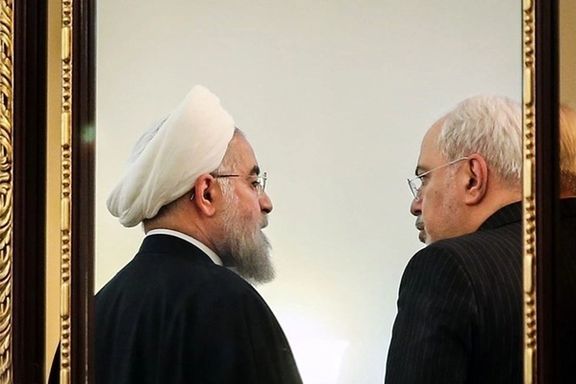
“In the previous government, they said that we were advancing our goals in a win-win game, but what does that mean? Thinking of the enemy as a friend is a very dangerous attitude. That's also why it's taking so long to resolve the Palestine issue."
Vahidi even tried to blame foreigners for the apparent apathy of Iranians toward the regime’s highly engineered parliamentary elections. Concerned about the elections, the interior minister stated: “The enemy is doing everything in its power to deter people from voting, but our people will defeat the enemy once again with their enthusiastic participation.”
Meanwhile, Javad Zarif, Rouhani’s Foreign Minister was recently quoted as saying: "If Iran is dragged into the Israel-Gaza war, nothing is going to happen to any of Iran's state officials! The bombs are going to fall on the people."
Rouhani himself has also warned against Iran becoming involved in the Israel-Hamas conflict, pointing out that by inflaming the conflict, the regime is putting the country at risk. In his remarks, he emphasized the potential consequences of direct involvement or indirect involvement through proxies, asserting that "a mistake, a wrong decision, or an imprecise action could drag the flames of war towards us".
In particular, the government's actions and stance regarding the Gaza war seem to be exposing the cracks in the regime.
In a recent summit of Islamic and Arab states in Riyadh, Iran accepted the two-state solution, which is contrary to its central ideology of opposing the existence of the Jewish state. Palestine would be an independent state alongside Israel as part of the two-state solution to the Israeli-Palestinian conflict.
As a result, there was a major backlash and calls for the Foreign Minister to be impeached.
Although the current administration is attempting to appeal to hardliners by claiming that they are not isolated, but rather the “isolated nation is the United States”, the facts show a different picture.
With the election of Ebrahim Raisi in 2021, the regime has only increased its isolation from the international community and exacerbated internal tensions.
In the latest instance, Iranian punitive economic and political measures against Israel were rejected by Muslim leaders at the Arab summit and excluded from the final resolution.
The move to support Russia's invasion of Ukraine and speed up the nuclear program, led Western countries to condemn the Islamic Republic and impose more sanctions on its officials and entities. Iran has reportedly supplied Russia with hundreds of suicide drones for use against Ukraine’s civilian infrastructure and cities since mid-2022.
Also, attempts by the regime to substitute relationships with other countries - more specifically China- failed after Beijing backed the UAE in the Abu Musa and Tunbs island dispute.
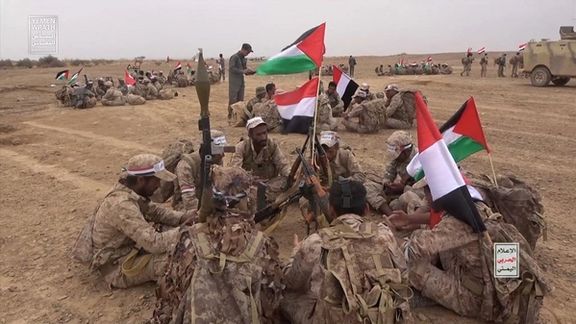
An Iranian ultraconservative lawmaker claims Houthis have targeted Israeli ships following public statements against Israel by Iran's ruler Ali Khamenei.
Mahmoud Abbaszadeh-Meshkini, who sits on the Parliament’s National Security and Foreign Policy Committee, said, “Resistance forces are prepared to handle a variety of scenarios.”
Ali Khamenei and President Ebrahim Raisi have urged Islamic countries to impose economic sanctions against Israel since its retaliatory strikes against Hamas and the ground offensive in Gaza. Tehran demanded an oil embargo and measures to impede Israeli trade.
The Houthis are part of the so-called "Axis of Resistance" which also includes Lebanon's Hezbollah; a coalition of Iranian-supported armed groups that fight Israeli and American forces in the region.
Following Hamas' attacks on Israel on October 7, which killed 1,200 people, Iranian proxy forces have attacked American and coalition troops in Iraq and Syria and launched missiles toward Israel.
In a statement released yesterday, the Houthis, who control Yemen's capital amid a civil conflict, vowed to attack Israeli ships in the Red Sea and Bab-el-Mandeb Strait, which is a critical route for trade and oil tankers.
"Exports of oil and food to the Zionist regime must be blocked," Khamenei said in a televised address on November 1.
Similarly, as part of his 10 proposals at the Arab Summit in Riyadh, President Ebrahim Raisi proposed a boycott of Israeli goods and a cutoff of all economic relations with Israel, primarily in the area of energy.
Meshkini has also initiated an impeachment proceeding against the Iranian foreign minister, in protest over government policies which he claims are too soft towards Israel.
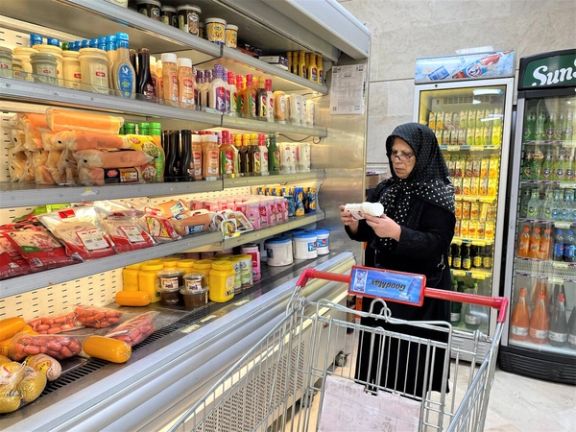
The inflation rate in the past Iranian month was its highest in two years as the government grappling with large budget deficits continues to print money.
According to the latest data released by the Central Bank of Iran (CBI), the inflation rate in the country has surged to its highest level in the past 22 months, hitting 54.8% for the month of Mehr (ended October 22), economic website EcoIran reported, after analyzing data released by the CBI. The central bank rejected the report as false, insisting that the inflation is about 45 percent. It claimed that there were discrepancies in calculations.
EcoIran says the number is based on the Central Bank's tables, which are presented periodically to the judiciary to calculate overdue debts, fines, and dowries. The CBI rejected EcoIran’s figure as “wrong” but did not elaborate on the table presented in its document.
The Statistics Center of Iran (SCI) and the CBI claim that the rate of annual inflation has dropped to 45.5 percent, nearly the same level as a year ago, but some things cannot be denied via changing technical definitions. Food prices have risen much faster than the official inflation rate, in some instances hitting 100-percent in 2022. ILNA news agency reported this week that the decline in people's purchasing power is so steep that some workers are surviving the second half of the month with just eating "one egg a day."
The central bank and the ministry of the economy stopped issuing regular and precise economic data in 2019 as US sanctions imposed the previous year pushed an already struggling economy into a deep recession. In the absence of credible data by the Central Bank of Iran about inflation, Iran's Statistics Center became the primary official entity announcing these figures. Government officials and the central bank usually announce lower inflation figures for consumer goods.
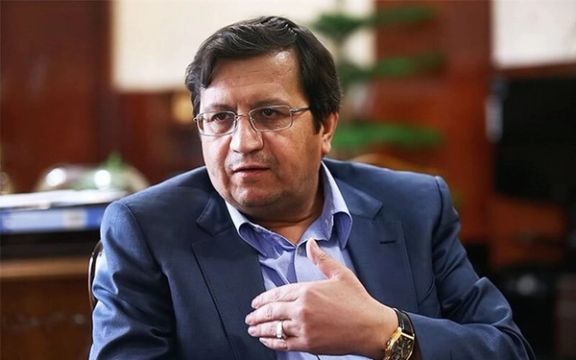
Iran’s former chief banker Abdolnaser Hemmati, an outspoken critic of the current administration’s economic policies, said Wednesday that the government has failed to control inflation or the devaluation of the rial. He said that the measures the Raisi’s administration has taken to control the economy has led to “an economic repression and more rente in the currency market," a French term used in Persian to imply privileges resulting from undue influence.
The currency has lost its value 12-fold since 2018 when the United States withdrew from the JCPOA nuclear accord and imposed sanctions. The rial has also lost about 80 percent of its value compared to mid-2021 and close to 50 percent since December 2021.
The government is desperate to control the currency market hoping that it can artificially keep the Iranian rial high. It created multiple exchange rates for rial against the dollar and other foreign currencies, providing subsidies – or cheaper dollars – for the import of essential items. However, the system is manipulated by regime insiders or businesspeople with government connections.
Hemmati said that during the past seven months (since the start of the Iranian year in March) the CBI has supplied $20 billion via a special currency scheme known as NIMA. Exporters have to bring back hard currencies they earn to Iran and sell it at a cheaper rate to the government, which then makes it available to importers at less than than the market exchange rate. He elaborated that the 30-percent discount on the exchange rate provided in NIMA has amounted to an equivalent of $4.4 billion, claiming that about 50 to 100 percent of this amount is pocketed by intermediaries or importers with close links to the regime.
Mohammad Aram, the Deputy for Foreign Exchange at the Central Bank, announced earlier in the week that a total of $42 billion has been provided since March, a three-percent rise in comparison to the corresponding period last year. According to him, the Ministry of Industry, Mining, and Trade received $26.6 billion, the Agriculture Ministry received $10.4 billion, and the Health Ministry received $2.7 billion for importing their needs.
The US dollar is set at 285,000 to the rial in the special government scheme versus the free market where it is traded at about 510,000. The discrepancy between the two breeds corruption, as well-connected individuals and companies can buy cheap dollars through NIMA and instead of using it to finance imports, sell it on the currency market.
Numerous cases of such corruption have been revealed since 2018. The government also regularly sells dollars through the free market to currency dealers to support the beleaguered rial. Usually, these interventions have a limited and temporary effect.
Donya-e-Eqtesad, Iran’s most popular economic newspaper highlighted the paradox this week that the government is providing more foreign currency for the import of essential goods, but they are growing increasingly scarce in the market.
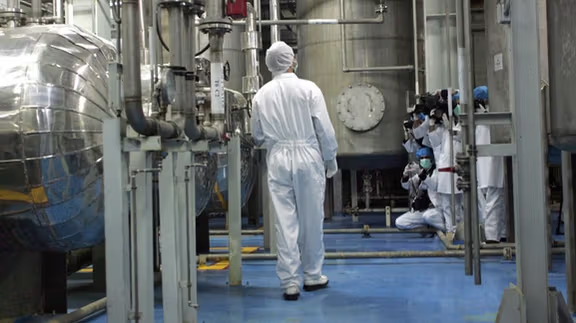
Iran has enough uranium enriched to up to 60% for three atom bombs and is still stonewalling the agency on key issues, confidential IAEA reports showed on Wednesday.
Iran's stock of uranium enriched to up to 60% grew by 6.7 kg (14.8 pounds) to 128.3 kg (282.9 pounds) since the last report on September 4, one of the two reports to member states seen by Reuters said. That is more than three times the roughly 42 kg (92.6 pounds) that by the IAEA's definition is theoretically enough, if enriched further, for a nuclear bomb. Weapons-grade is around 90% purity.
In the second report issued on Tuesday, the agency said there still had been no progress on two pressing issues in Iran: getting more monitoring equipment re-installed after it was removed at Tehran's behest last year and getting answers on the origin of uranium particles found at two undeclared sites.
It is the second time in a row that the IAEA's quarterly reports have said there was no progress on either issue.
Negotiation since April 2021 to revive the Obama-era JCPOA nuclear deal have failed to make progress, and Iran continues to expand its nuclear program. The previous US administration withdrew from the agreement in 2018 and imposed harsh economic sanctions. Iran retaliated by starting to violate the JCPOA limits and substantially increased both the quantity and the quality of its uranium enrichment. It also reduced monitoring by the International Atomic Energy Agency.
Iran did not agree to a compromise plan proposed by the European Union in 2022 to revive the agreement, despite the Biden administration’s stated goal of finding a diplomatic solution.
There also had been no progress in getting Iran to reverse its so-called "de-designation" in September of some IAEA inspectors assigned to the country.
The move effectively barred some inspectors, who diplomats said were from France and Germany and the IAEA said were among its most experienced experts, from working in Iran.
Tehran's move, which the IAEA called "disproportionate and unprecedented", was in response to a call on Iran by the United States, France, Britain and Germany at the IAEA's 35-nation Board of Governors to give credible explanations on the uranium particles and let the IAEA install more surveillance cameras. In fact, the Western powers did not pursue any censure of Iran as expected, and simply issued a rebuke.
"This measure, while formally permitted... was exercised by Iran in a manner that directly and seriously affects the Agency's ability to conduct effectively its verification activities in Iran, in particular at the enrichment facilities," the second IAEA report said.
"The (IAEA) Director General (Rafael Grossi) continues to strongly condemn Iran's sudden withdrawal of the designations of several experienced Agency inspectors," it added.
Washington has informally relaxed sanctions on Iran’s oil exports and allowed blocked funds in Iraq and South Korea to be released, but Tehran has shown no willingness to resolve the nuclear issue.
US officials and experts believe that having stockpiled enriched uranium, Iran can build a bomb in a matter of months. It can be considered as a nuclear threshold state.
With reporting by Reuters
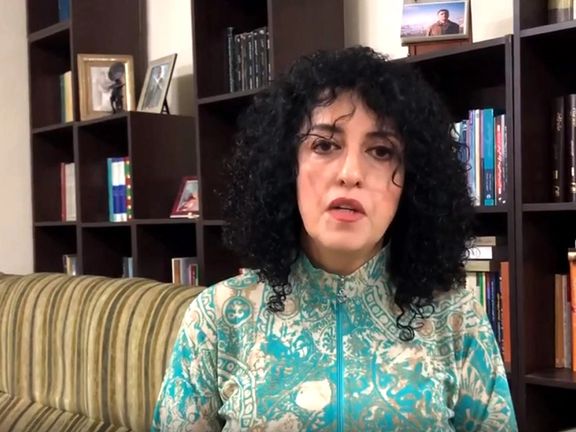
Narges Mohammadi, the imprisoned Nobel Peace Prize laureate, was once again denied medical care for refusing to wear the mandatory hijab.
In a post on her Instagram, an audio file was shared in which female prisoners chant, "Prisoners, Support, Support!"
Originally scheduled for a cardiac angioplasty on Wednesday, Narges Mohammadi's transfer from Evin Prison to the hospital was thwarted, citing her refusal to comply with mandatory hijab, a position she has stood firm on during her years in and out of detention.
Medical tests conducted last week revealed Mohammadi's critical health condition, including "blockage in two heart arteries, fluid accumulation around the heart, and severe inflammation of the gallbladder."
Mohammadi had previously reported her transfer to the hospital on November 8, without a headscarf and wearing a business suit. However, she returned to prison shortly afterward.
Since November 6, Mohammadi had been on a hunger strike in protest against the "Islamic Republic's policy of delaying medical attention for sick prisoners, risking the health and lives of human beings" and "the policy of death or compulsory hijab for Iranian women." She was refusing to comply with hijab laws in exchange for treatment.
Following her civil rights activism, Mohammadi was awarded the Nobel Peace Prize in 2023. International human rights organizations, including Reporters Without Borders, strongly condemned denying Mohammadi access to medical care, and the Nobel Committee expressed severe concern about her health.